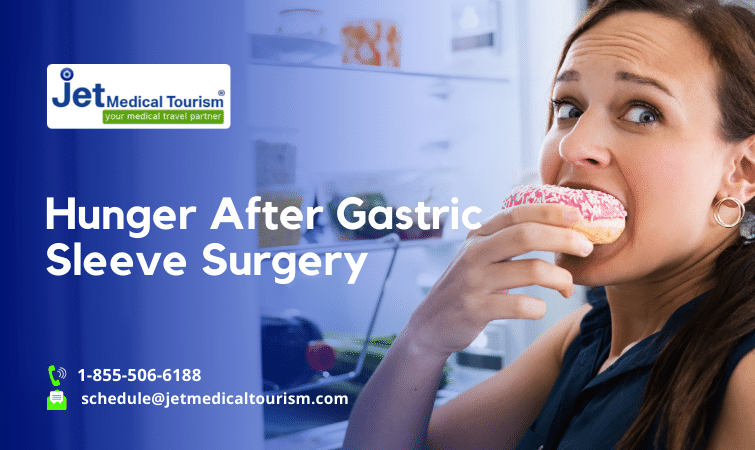Hunger After Gastric Sleeve Surgery: A Comprehensive Guide
Hunger is a natural biological response that plays a crucial role in regulating our food intake and maintaining a healthy weight. However, for individuals who have undergone gastric sleeve surgery, the experience of hunger can change significantly.
After gastric sleeve surgery, patients typically go through different stages of hunger experience. In this comprehensive blog post, we’ll delve into the reasons behind feeling hungry after gastric sleeve surgery and provide valuable tips to manage hunger pains effectively.
Reasons To Feel Hungry After a Gastric Sleeve Surgery
Hormonal Changes
Gastric sleeve surgery can significantly alter the levels of hormones responsible for regulating hunger and satiety, such as ghrelin and leptin. Ghrelin, often referred to as the “hunger hormone,” is primarily produced by the stomach. After gastric sleeve, the removal of a portion of the stomach initially leads to a decrease in ghrelin levels, which can reduce hunger sensations. However, over time, the remaining stomach tissue can adapt and begin producing ghrelin again, potentially leading to an increase in appetite and hunger pangs.
READ: Ghrelin Hunger Hormone
Adjustment Period
It takes time for the body to adapt to the new digestive system and eating patterns after gastric sleeve surgery. During this adjustment period, patients may experience increased hunger levels as their bodies adjust to the altered stomach size and decreased caloric intake.
Smaller Stomach Capacity
With a drastically smaller stomach pouch, patients may feel hungry more quickly after eating, as the stomach empties faster than before the surgery. The reduced capacity means that the body signals fullness much sooner, and hunger can return more rapidly after a meal.
Metabolic Changes
Gastric sleeve surgery can also impact the body’s metabolism and energy expenditure. As the body adjusts to the new weight and digestive processes, metabolic changes may occur, potentially affecting hunger and satiety signals.
When Do You Start Feeling Hungry After Gastric Sleeve?
Most patients begin to experience hunger sensations within the first few weeks after gastric sleeve surgery. The initial post-operative period typically involves a liquid diet, followed by a gradual transition to pureed foods and eventually solid foods. As the body adjusts to the new stomach size and dietary changes, hunger pangs may become more noticeable.
However, it’s important to note that the timing and intensity of hunger can vary from individual to individual, depending on factors such as hormonal responses, metabolic rate, and adherence to dietary recommendations.
Does Ghrelin Come Back After Gastric Sleeve?
Yes, ghrelin levels can potentially return after gastric sleeve surgery, although the extent and timing of this phenomenon can vary among individuals. Ghrelin is a hormone produced primarily by the stomach that stimulates appetite and hunger. After gastric sleeve surgery, ghrelin levels initially decrease due to the removal of a portion of the stomach.
However, over time, the remaining stomach tissue can adapt and begin producing ghrelin again. This resurgence of ghrelin can contribute to an increase in hunger sensations and appetite. Some studies suggest that ghrelin levels may start to rise as early as a few months after surgery, while others indicate that it may take several years for ghrelin levels to return to pre-surgical levels.
It’s essential to note that the return of ghrelin does not necessarily mean that weight regain is inevitable. With proper diet, exercise, and lifestyle modifications, many patients can successfully manage hunger and maintain their weight loss despite potential increases in ghrelin levels.
Binge Eating After Gastric Sleeve
While gastric sleeve surgery can help control hunger and promote weight loss, some patients may experience binge eating episodes. Binge eating is characterized by consuming an excessive amount of food in a short period, often accompanied by a sense of loss of control over eating.
There are several potential reasons why some individuals may struggle with binge eating after gastric sleeve surgery:
Emotional Eating
For some patients, eating can be a coping mechanism for dealing with stress, anxiety, or other emotional issues. If these underlying emotional factors are not addressed, binge eating episodes may occur.
Hunger Misinterpretation
Patients may misinterpret physical sensations, such as stomach rumbling or mild discomfort, as hunger signals, leading them to overeat or binge.
Lack of Proper Nutrition
If patients fail to follow a balanced and nutrient-dense diet after surgery, they may experience persistent hunger or cravings, increasing the risk of binge eating.
Addiction Transfer
In some cases, individuals who have struggled with addictive behaviors, such as overeating or substance abuse, may transfer their addictive tendencies to binge eating after surgery.
Binge eating can lead to discomfort, stretching of the stomach pouch, and potential weight regain if left unaddressed. It’s crucial to seek professional support from a therapist or counselor specializing in eating disorders and weight management to develop healthy coping strategies and address the underlying causes of binge eating behavior.
Is It Normal To Be Hungry All The Time After Gastric Sleeve?
Experiencing constant, excessive hunger after gastric sleeve surgery is generally not considered normal. While some hunger sensations are expected, especially in the early stages, persistent and excessive hunger may indicate an underlying issue or a need for dietary adjustments.
It’s important to distinguish between true physiological hunger and other sensations, such as cravings or emotional hunger. True physiological hunger often presents as a gradual sensation accompanied by physical symptoms like stomach rumbling or fatigue.
If you find yourself feeling excessively hungry all the time after gastric sleeve surgery, it’s essential to consult with your bariatric surgeon, dietitian, or healthcare team. They can evaluate your situation, rule out any medical concerns, and provide guidance on dietary modifications or lifestyle changes that may help manage your hunger levels.
Persistent hunger can sometimes be a sign of inadequate protein or fluid intake, hormonal imbalances, or other underlying conditions that require professional assessment and intervention.
Tips To Avoid Hunger Pains After Gastric Sleeve
While some hunger sensations are normal after gastric sleeve surgery, there are several strategies you can employ to help manage and minimize excessive hunger pains:
1. Eat Protein-Rich Foods
Incorporate lean proteins, such as chicken, fish, eggs, and legumes, into your meals. Protein can help promote satiety and curb hunger pangs by slowing down the emptying of the stomach and providing a sustained feeling of fullness.
2. Stay Hydrated
Drinking enough water and low-calorie fluids can help you feel fuller and reduce hunger sensations. Aim to consume at least 64 ounces (2 liters) of fluids daily, and sip on water or sugar-free beverages throughout the day.
3. Incorporate Fiber
Foods high in fiber, like vegetables, fruits, and whole grains, can aid in prolonging feelings of fullness and preventing overeating. Fiber adds bulk to your meals and slows down the digestion process, helping you feel satisfied for longer.
4. Practice Mindful Eating
Slow down your eating pace, chew thoroughly, and pay attention to hunger and fullness cues from your body. Mindful eating can help you recognize when you’re truly hungry and when you’re feeling satisfied, preventing overeating.
5. Manage Stress
Stress can trigger emotional eating and increase hunger hormones like ghrelin. Practice stress management techniques like meditation, deep breathing, or exercise to help regulate your appetite and reduce stress-related hunger.
6. Eat Small, Frequent Meals
Eating smaller, more frequent meals throughout the day can help regulate hunger levels and prevent excessive hunger. Aim for three main meals and two or three snacks, spaced out every three to four hours.
7. Incorporate Healthy Fats
Healthy fats, such as those found in avocados, nuts, and olive oil, can help promote satiety and curb hunger pangs. However, it’s important to consume them in moderation, as they are calorie-dense.
8. Avoid Trigger Foods
Steer clear of foods that can trigger overeating, such as sweets and highly processed snacks.
9. Seek Professional Support
If you continue to struggle with persistent hunger or binge eating episodes, consider seeking guidance from a registered dietitian, therapist, or healthcare professional specializing in bariatric surgery. They can provide personalized strategies and support to help you better manage your hunger and achieve long-term success.
What Happens If You Eat A Lot After Gastric Sleeve?
Eating too much or consuming large portions after gastric sleeve surgery can lead to unpleasant consequences and potentially hinder your weight loss progress. Here are some potential risks and side effects of overeating after gastric sleeve surgery:
a) Discomfort and Nausea
The smaller stomach pouch has a limited capacity, and overeating can cause discomfort, bloating, and nausea. Consuming too much food can stretch the pouch, leading to unpleasant symptoms.
b) Vomiting
Overeating can also cause vomiting, as the stomach pouch is unable to accommodate large quantities of food. Persistent vomiting can lead to dehydration and other health issues.
c) Stomach Pouch Stretching or Damage
Repeatedly overeating and stretching the stomach pouch can potentially lead to permanent damage or enlargement of the pouch, reducing the effectiveness of the surgery and potentially contributing to weight regain.
d) Nutrient Deficiencies
Consuming large portions of food, especially if it’s low in nutritional value, can increase the risk of developing nutrient deficiencies. Gastric sleeve surgery already puts patients at risk for certain deficiencies, and overeating can exacerbate this problem.
e) Dumping Syndrome
In some cases, overeating after gastric sleeve surgery can trigger dumping syndrome, a condition where food moves too quickly from the stomach into the small intestine. Symptoms may include nausea, vomiting, diarrhea, abdominal cramps, and other unpleasant side effects.
f) Weight Regain or Stalled Weight Loss
Perhaps the most concerning consequence of overeating after gastric sleeve surgery is the potential for weight regain or a stall in weight loss progress. If you consistently consume more calories than your body requires, you may not achieve your desired weight loss goals, or you may even start regaining weight.
g) Emotional Distress
Overeating after gastric sleeve surgery can also take an emotional toll. Patients may experience feelings of guilt, disappointment, or frustration, which can further contribute to emotional eating patterns and potentially hinder their weight loss journey.
It’s crucial to follow portion control guidelines and listen to your body’s hunger and fullness cues to avoid these complications. Your bariatric healthcare team will provide specific recommendations on appropriate portion sizes and meal plans tailored to your needs.
If you find yourself struggling with overeating or binge eating episodes, it’s essential to seek support from a counselor, therapist, or support group. They can help you develop coping strategies and address any underlying emotional or behavioral issues that may be contributing to your overeating tendencies.
Remember, gastric sleeve surgery is a tool, but long-term success requires commitment to lifestyle changes, including a balanced diet, regular physical activity, and ongoing support from your healthcare team.
Conclusion
Understanding and managing hunger after gastric sleeve surgery is crucial for long-term success. By recognizing the reasons for post-op hunger, adhering to dietary guidelines, addressing psychological factors, and seeking support when necessary, patients can effectively navigate their new relationship with food. Implementing these strategies helps ensure that the benefits of gastric sleeve surgery are maximized, promoting sustained weight loss and improved overall health. Regular follow-ups with healthcare providers and mindful eating practices are key to maintaining a healthy lifestyle post-surgery.
Redefine Your Life with Gastric Sleeve Surgery in Mexico
Don’t let cost stand in the way of your health transformation. Opt for gastric sleeve surgery in Mexico, where exceptional medical care is both affordable and accessible.
With expert surgeons and cutting-edge technology, you’ll receive top-tier medical care at a fraction of the cost. Begin your journey. Contact us now to discuss your options.




